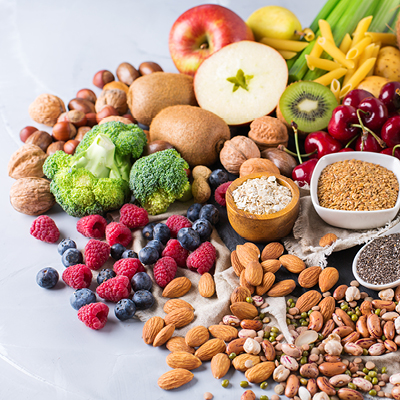Lowering Your Blood Pressure, Naturally
Posted October 11, 2018 by Roger B. Chaffee, M.D., FACC

Dietary Approaches to Stop Hypertension (DASH)
So you just found out that you have high blood pressure (HBP). Well, you’re not alone. Almost half of adults in the U.S. have it – and most don’t even know it.
Fortunately, hypertension – the medical term for HBP – can typically be controlled with the right medication and lifestyle changes. In fact, lifestyle modifications like healthier eating and regular exercise may be able to do more than just help medication manage HBP. Studies show they may actually decrease the need for blood pressure-lowering medication altogether.
More specifically, researchers suggest that people with HBP may see a similar or greater reduction in systolic blood pressure after following a Dietary Approaches to Stop Hypertension (DASH) and low-salt diet as those who take antihypertensive drugs. (Your systolic blood pressure is represented as the top number in your reading – the one that refers to the amount of pressure in your arteries during the contraction of the heart muscle.)
If you haven’t heard of DASH, it’s an eating plan that promotes a variety of foods rich in nutrients that help lower blood pressure, such as potassium, calcium and magnesium. Its emphasis is heavy on fruits and vegetables balanced with the right amount of protein, low- and non-fat dairy, and heart-healthy fats. Sample menus include:
- High amounts of vegetables and fruits
- Low-fat dairy products
- Whole grains
- Fish
- Poultry
- Nuts
The DASH diet limits foods high in sugar and saturated fats, like red meats, full dairy, and tropical oils (like coconut, palm kernel and palm).
How effective is it? According to a 16-week study presented recently at the American Heart Association's Joint Hypertension 2018 Scientific Sessions, which outlines new hypertension research each year, those who followed the DASH diet, participated in counseling and underwent supervised exercise three times per week were most successful overall in lowering their blood pressure.
While this study shows that lifestyle modifications, including diet and exercise, may help decrease the need for blood pressure medications, further research is necessary before recommendations can be made. The findings do suggest, however, that a change in diet should be a first step for adults who are at an increased risk of high blood pressure.
Following the DASH diet can also improve your cholesterol profile. Four National Heart Lung and Blood Institute funded studies have shown the benefits for lowering blood pressure and cholesterol when the DASH diet was compared to the typical American diet.
One of my concerns in regard to the DASH study mentioned above, and others similar to it, is its 16-week duration. Over time, people often tend to trend back toward old lifestyles, losing everything that they have worked so successfully to gain. It takes a sustained effort to avoid relapsing into old habits. And, contrary to its name, the DASH diet isn’t a quick fix. It’s a lifelong approach to healthy eating.
So whatever you and your doctor decide is the right treatment for your hypertension, whether traditional medication and/or lifestyle modification, please keep one thing in mind. Treatment for HBP must be ongoing in order to get your blood pressure down. And keep it down.
Appointments are available at more than a dozen convenient office locations in Summit, Medina and Portage Counties. With so many locations, our cardiac patients can expect to receive the right care at the right time – no matter where they choose to receive it within the Summa Health System.
About the Author
Vitality eNews Sign Up
Receive the Summa Health eNewsletter for the latest health tips, advice and updates.


 Listen to this episode of the Healthy Vitals Podcast featuring Roger Chaffee, MD.
Listen to this episode of the Healthy Vitals Podcast featuring Roger Chaffee, MD.